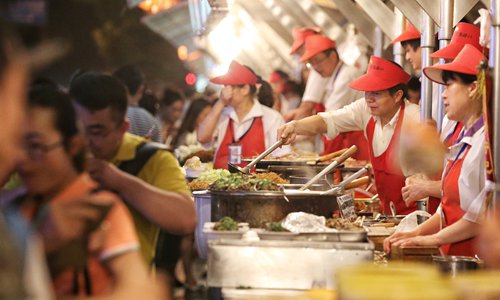China’s street vending needs scientific, standardized and smart management: experts
By Wang Qi Source:Global Times Published: 2020/6/7 16:25:11

Residents enjoy snacks at Beijing's Donghuamen night market before it was closed in June 2016. Photo: VCG
Urban management experts and state-run news outlets have called for scientific and standardized supervision and regulation of the reemerging street stall economy in China, which is believed to create a large number of jobs in a short time amid the wave of work resumption in China's post-epidemic era.
Beijing-based local newspaper Beijing Daily was the first to question "if Beijing was a proper place for street vendors" on Saturday through an editorial. On the same day, the newspaper reported that Beijing's city administration will strictly supervise street vendors who occupy roads while operating their business, after receiving complaints from citizens.
Just as Beijing Daily's editorial was causing controversy online, China's flagship media CCTV and People's Daily also called for scientific management based on local situations, and for overly lax or strict law enforcement to be avoided.
The resurgence of the street vending economy is important, but situations vary between different cities. If its development doesn't match reality, it may backfire and lead to undesired results, said CCTV on Saturday.
Whether or not street vending economy is suitable for a city, we should insist on judging from the actual situation. As China's capital, Beijing represents China's image and has unique functions and management requirements, said the Beijing Daily.
Beijing's downtown areas are concentrated with government departments, business districts and are densely populated. The pressure brought by street vendors to urban management, environmental sanitation, transportation and other aspects is obvious. Once the old problems such as dirty and noisy streets, fake and shoddy goods, traffic jams, unhygienic and uncivilized behavior come back, the previous governance achievements may be lost, which will not be conducive to building a good image and promoting high-quality economic development, Beijing Daily explained.
The regulation of street vending has become a hot topic on Sina Weibo. Some internet users believe that curbing street vending will take away from the flavor of city life, and seems like an unfriendly move to people on the lower rungs of the social ladder.
"I don't want to see Beijing become an impersonal city full of high-end stuff… that's a form of discrimination against low status people," posted an internet user on Sina Weibo.
Luo Yameng, a Beijing-based urban management expert, told the Global Times on Sunday that street vending is a double-edged sword in terms of social and economic development.
As can be observed in most places around the world, such as London, New York and Singapore, street vending is a long-term requirement for inclusive and sustainable urban development, which also has great significance in building a harmonious society.
"The easing of street vending is a special policy for a special time period… It gives low status people a way and hope of earning a living, but cannot be overly-used," said Luo, noting that street vending certificates should be mainly granted to those who are facing special difficulties earning a living, especially those in the mid and western regions rather than Beijing.
Luo pointed out that street vending also has a destructive and negative side, including illegal operation sites, the destruction of urban spatial order (obstructing the normal passage of pedestrians and vehicles, as well as disturbance to residents), and damage to the credit system, which is mainly reflected in sales of fake and inferior commodities, and especially substandard food.
A night market in Dalian, Northeast China's Liaoning Province, was temporarily closed after some residents recently reported that it had caused many problems including traffic jams and rubbish-strewn roads, which seriously affected residents' daily lives.
The future of China's street vending lies in a scientific layout, standardized regulation, intelligent supervision and real-name registration… and the establishment of an information sharing and credit system is also crucial for the healthy and long-term development of street vending, said Luo, noting it is also the right time to further regulate the street stall sector.
"I totally understand. As our capital, Beijing needs to sacrifice a certain amount of dynamism for stability. Beijing needs some street vending but it must be conducted in an orderly manner," a resident of Beijing's Chaoyang district surnamed Cheng told the Global Times on Sunday.
At a press conference after the third session of the 13th National People's Congress on May 28, Chinese Premier Li Keqiang praised some cities' policies that encourage mobile street vending to address the issue of unemployment.
The Office of the Spiritual Civilization Development Steering Commission of the Communist Party of China (CPC) Central Committee announced on May 29 that it would not include street vendors who occupy outdoor spaces or other public areas in city assessments for 2020, indicating a temporary relaxation on the already tight management of the country's street food sector.
Tian Yun, vice director of the Beijing Economic Operation Association, recently said the opening-up of street vending will bring higher requirements for urban management, but at the same time, create over 9 million jobs this year.
Posted in: SOCIETY,CHINA FOCUS